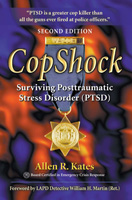
CopShock: Second Edition
Surviving Posttraumatic Stress Disorder (PTSD)
by Allen R. Kates, MFAW, BCECR
According to the National Law Enforcement Officers Memorial Fund (NLEOMF), about 160 U.S. law enforcement officers on average are killed on the job each year. We must never forget those who gave their lives. After the initial shock of a police officer’s death, departments do not offer ongoing support to family members, coworkers and friends. Continuing contact with the department would help survivors heal.
The following organizations offer support and information for the families and friends of those who died.
100
Club
Supported by the donations of its members and the
community, the 100 Club provides financial assistance to families of public
safety officers and firefighters who are seriously injured or killed in the
line-of-duty, and also provides resources to enhance their safety and welfare. A
benevolent non-profit organization, the 100 Club operates in many US states. To
find out which states, please go to http://www.100clubChicago.org and
click on the club directory.
No amount of money can bring back somebody’s
loved one, but the 100 Club tries to ease some of the financial burden during a
time of severe crisis and loss. The amount of financial aid varies from club to
club and state to state.
For basic information, please go to the 100 Club
of Arizona website. Then click on Resources and Links to reach other states. Go
to: http://www.100club.org. Write: 100
Club, 5033 N. 19th Avenue, Suite 123, Phoenix, AZ 85015. Phone:
602-485-0100.
Concerns of Police Survivors
(COPS)
Concerns of Police Survivors provides programs and
services for devastated families, coworkers and friends of law enforcement
officers killed in-the-line-of-duty. The organization offers seminars,
scholarships, peer support, child counseling, summer camp and retreats for
survivors as well as training to police agencies on how to respond to an
officer’s death.
Go to: http://www.nationalcops.org/. Write:
Suzie Sawyer, Executive Director, COPS National Office, P.O. Box 3199, S.
Highway 5, Camdenton, MO 65020. Phone: 573-346-4911.
National Law Enforcement
Officers Memorial
The National Law Enforcement Officers
Memorial in Washington, DC, honors all of America’s federal, state and local law
enforcers killed in-the-line-of-duty. It has catalogued information on more than
18,000 law enforcement deaths, and it built and maintains a Memorial where all
those names can be seen and visited by friends and loved ones. In addition, the
NLEOMF’s website con-tains a complete listing.
A memorial is a sacred
responsibility. It allows loved ones and friends to reclaim a moment with the
person who died. It lets them honor their memory.
When you see name after
name, you realize that they are not just statistics. They are somebody’s child,
someone’s husband, or wife, mother or father, somebody’s friend. A memorial
means they are not forgotten, that they have not been left behind.
Many of
us derive a lot of comfort from visiting a memorial such as this. Those who have
died live on in our hearts. The Memorial sits on three acres of federal park
land called Judiciary Square, located on the 400 block of E Street, NW. A glance
around the space finds plush carpets of grass, nearly 60,000 plants and
128 trees decorating the Memorial grounds. Each year, around the first of April,
some 14,000 orange and yellow daffodils make the Memorial one of Washington's
most spectacular attractions.
If you can visit Washington, please go to
the Memorial and honor our law enforcement dead.
For information online,
please go to http://www.nleomf.com. org. Click on Visitor Information, and then on the
Walking Tour for points of interest. A separate click will get you a map of the
memorial. You can also schedule a guided tour of the memorial on this
website.